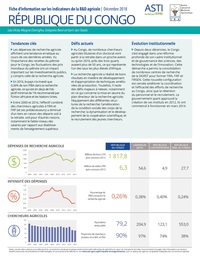Authors:
Léa Vicky Magne Domgho, Grégoire Bani and Gert-Jan Stads
Year:
2018
Publisher
International Food Policy Research Institute and Institut National de Recherche Agronomique.
Back to:
Key trends
- Agricultural research expenditures have shown an erratic trend in recent years. Given the importance of oil revenue to Congo’s economy, fluctuations in global oil prices have an important impact on public investments, including agricultural research investment.
- In 2016, the country invested only 0.26% of its AgGDP in agricultural research, which is below the minimum target of 1% recommended by the African Union and the United Nations.
- Between 2000 and 2016, the number of agricultural researchers at IRA and IRF (and their predecessors) decreased by one-third due to staff retirement and attrition for other reasons, including low salary levels compared with the higher education sector.
Current challenges
- Congo’s agricultural researchers are among Africa’s oldest. As of 2016, close to three quarters of Congo’s PhD-qualified agricultural researchers were over the age of 50 and approaching retirement.
- Congo’s agricultural research system has performed relatively well in terms of development and adoption of improved production techniques. However, major challenges remain, particularly with regard to the implementation of the master plan for agricultural research; adequately equipping the different research stations; improving social conditions of research staff; stimulating scientific cooperation; and the recruitment of young researchers.
Institutional evolution
- Over the past two decades, Congo’s S&T sector has gone through a process of institutional and governance reform. The consolidation of numerous research centers to form IRA, IRF, and IRSEN is expected to enhance the coordination and efficiency of agricultural research in Congo, as well as improve staff retention and recruitment. The government approved the creation of these institutes in 2012, and the new institutes commenced operations in March 2014.

